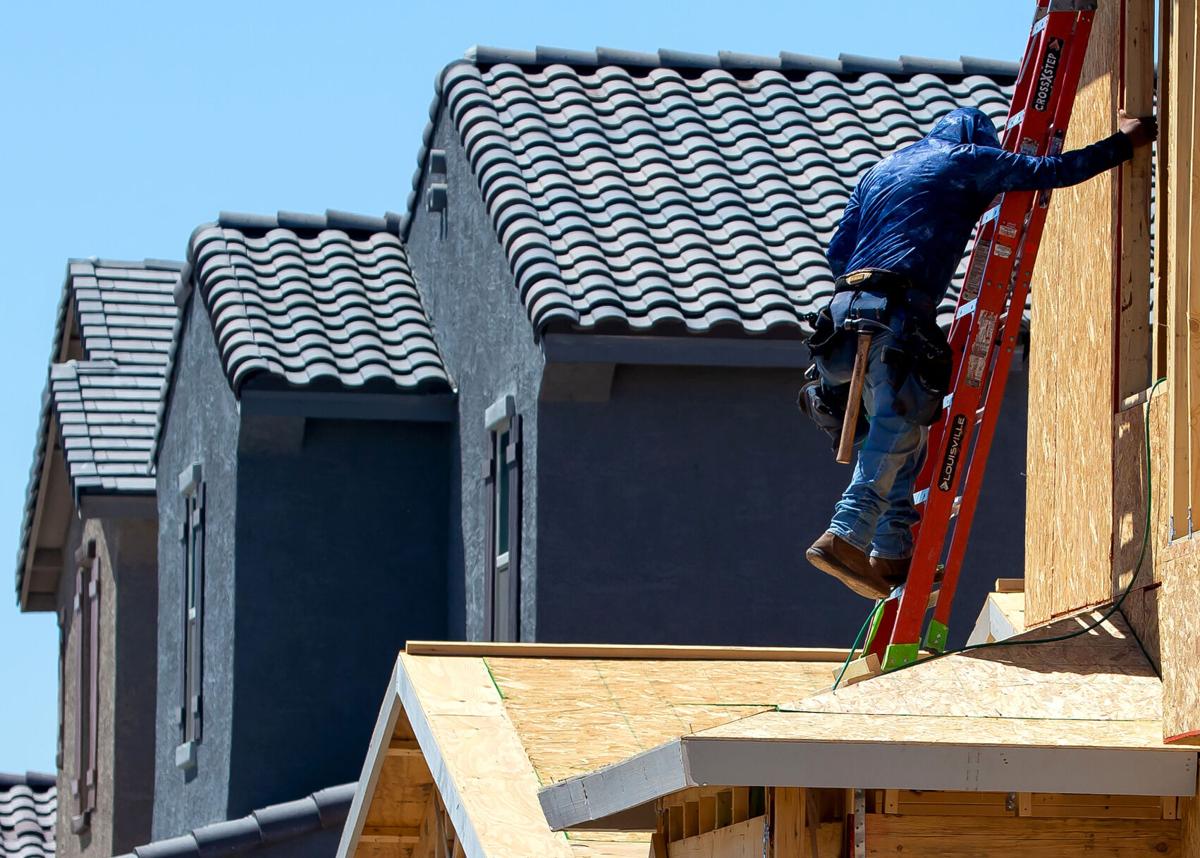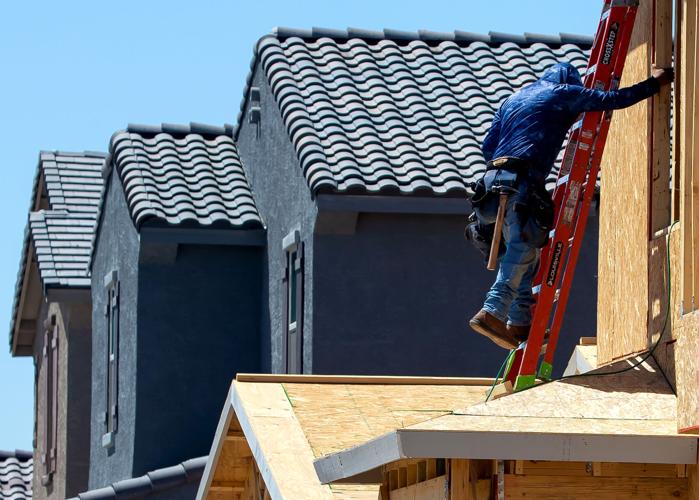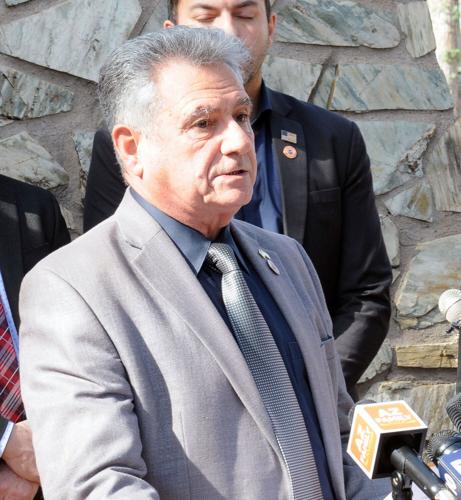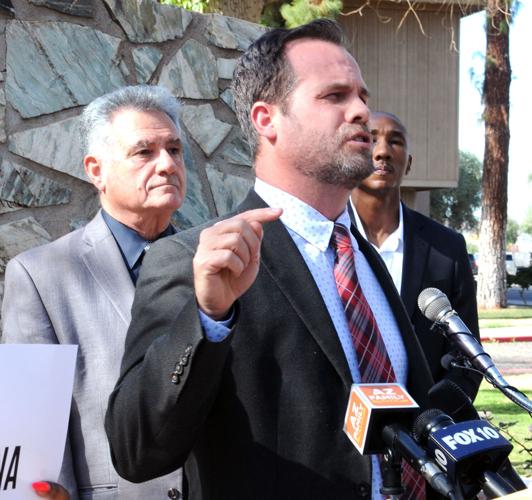PHOENIX т Republicans who control the УлшжжБВЅ Legislature are trying again to address the stateтs housing affordability crisis by limiting the ability of cities and towns to set minimum standards for single-family homes.
Rep. Leo Biasiucci and Sen. Sonny Borrelli, both from Lake Havasu City and serving as majority leaders of their respective chambers, are sponsoring identical proposals that would overrule zoning laws adopted by cities of 50,000 residents or more.
тWeтre here because the American dream of homeownership has become unattainable for many hardworking УлшжжБВЅ families and young adults,т Senate President Warren Petersen said at a Monday news conference.
Their idea is designed to spur the development of тstarter homes,т smaller homes that could be much less expensive than the traditional tract homes that dominate the stateтs single-family home housing market. Reducing lot size would help developers pack more homes into a project and reduce costs.
People are also reading…
Rising home costs have shocked longtime УлшжжБВЅ residents who are used to affordable homes. The median price for a detached single-family home in metro Phoenix sits at $430,000, a 53% rise just since 2020.
Their plan would erase minimum lot sizes and any setback requirement of more than 5 feet for new developments, bar cities from setting minimum square footages for new homes and block limits on how much of a lot must be left open as front, side or back yards beyond that minimum street setback.
The bills т and т also block municipalities from adopting rules mandating specific design, architectural or aesthetic elements for new homes, and it would bar cities from requiring homeowner associations or common walls, landscaping and other features maintained by HOA fees.
Petersen blamed cities and counties for the lack of affordable starter homes, saying lengthy delays in approving new developments, city-imposed тimpact feesт and things like design reviews are boosting costs for developers.
He also pointed a finger at Democratic Gov. Katie Hobbs for last yearтs actions by the state Water Resources Department. The department said a lack of available groundwater in some outlying parts of the Phoenix metro area meant it could not approve some new developments.
Biasiucci said there is no reason to tell a developer or a property owner that they can build on a lot only if the house has a minimum number of square feet.
He insisted, though, that the proposal would not override the right of cities to have zoning laws that limit the number of homes on a particular parcel. Biasiucci said if land is zoned for four homes per acre, nothing would allow the construction of more than that.
But Tom Belshe, executive director of the League of УлшжжБВЅ Cities and Towns, said thatтs flat wrong.
As the bills are written, he said, cities would be barred from limiting lot sizes, both in new developments and in existing neighborhoods. That removes the ability of municipalities and their citizens, through the planning process, to limit density.
тThis effectively gets rid of single-family zoning and deregulates the standards for development,т Belshe said.
тAnd it really severely limits setback requirements,т he continued. тYou might imagine youтre going to have people high-fiving from one window to the next between houses.т
He also said blaming municipalities for the shortage of new homes is inaccurate.
Homebuilders are just now getting back to the number of homes they were building in metro Phoenix before the mortgage crisis cratered the housing industry in 2008-2011, despite continued population growth in УлшжжБВЅ. He also noted that there are тa lotт of homes that have been approved but arenтt yet being built. In metro Phoenix alone, 275,000 new homes and apartments are in the development process and 106,000 have full approvals and are ready to be built, according to the League.
тSo, we may be one part of the issue, but there are a lot of other issues that are not being talked about at all,т Belshe said. тItтs all being laid at our feet.т
Those issues include rising material and labor costs and a shortage of skilled crafts people to actually build new home and apartment. And the rising cost of new and existing homes isnтt just an УлшжжБВЅ issue, since home prices have increased nationally as well.
While he acknowledged that sometimes city planning takes a long time, cities and towns are working on plans to adopt rules specifically intended to shorten the approval process.
This is the second year Republican lawmakers have taken aim at cities and how they regulate new home construction. Last year, an even more far-reaching plan to overhaul their ability to oversee zoning failed.
After months of battle, GOP lawmakers were unable to pass the overhaul bill sponsored by then-Rep. Steve Kaiser even after striking a deal with the League of УлшжжБВЅ Cities and Towns on a slimmed-down version.
That deal would have set state standards for zoning, requiring cities and towns to allow backyard casitas and a mix of new smaller developments including small lots sizes, duplex and tri-plex homes and manufactured housing. Democrats got Kaiser to include incentives for affordable apartments to be developed in the stateтs major metro areas.
In the end though, even many Republicans opposed a state takeover of local development rules and the plan was axed.
Belshe, the leader of the organization that represents cities and towns across the state, said his groupтs opposition to this yearтs plan is solid. And he said residents of cities and towns are not likely to agree to their local government being stripped of zoning rights and their residentsт participation in it.
тTo just say тwell, that doesnтt matter anymore, that isnтt necessary,т I donтt think citizens are going to like that,т Belshe said.
But Peterson, Borrelli, Biasiucci and other Republican lawmakers at Mondayтs news conference appeared determined to push through the new overhaul.
тGovernment has been the problem, particularly local governments,т Petersen said. тThis problem becomes bigger and bigger every time local government starts restricting builders from building.т
Howard Fischer is a veteran journalist who has been reporting since 1970 and covering state politics and the Legislature since 1982. Follow him on X, formerly known as Twitter, and Threads at @azcapmedia or email azcapmedia@gmail.com.















